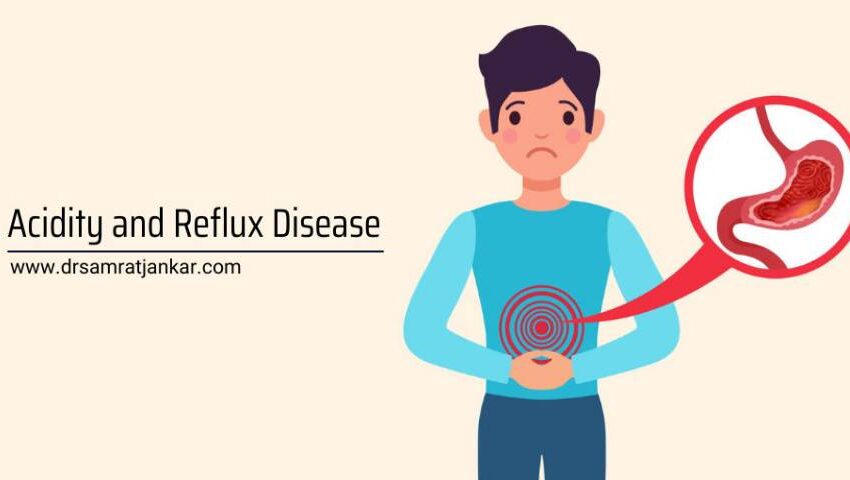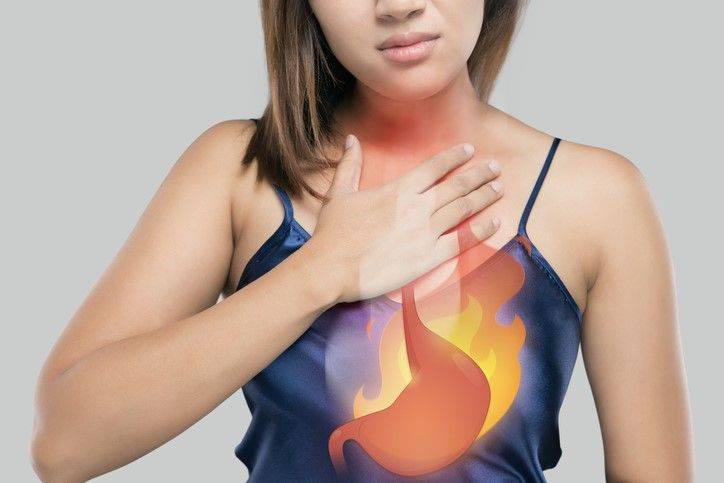
- 04/10/2021
- Dr. Samrat Jankar
- 0 Comments
- Blog
Acid reflux disease: What one should know?
Do you experience a burning sensation in your chest or throat? Usually, people refer to it as heartburn, but it has nothing to do with your heart despite its name.
Many conditions can cause heartburn, but the most common cause is acid reflux or a more chronic form of acid reflux known as GERD (gastroesophageal reflux disease).
The most common issue these days is acidity and reflux. It accounts for almost 60% of every gastroenterology consultation, according to Dr. Samrat Jankar, one of the best gastroenterologist in Pune.
It is associated with poor and irregular eating habits, drinking less water, eating spicy and oily foods, drinking a lot of milk, not getting enough sleep, and being overly stressed. Symptoms include extreme bloating, gas, upper abdominal pain, stomach and chest burning, and postprandial fullness.
What is acid reflux, and how does it affect you?
Food goes from your throat to your oesophagus, then into your stomach through an opening. Once the food has passed through, this opening usually shuts.
However, if it does not close completely or opens quite often, then the acid from your stomach may move up through the opening into your oesophagus and your throat. It might result in symptoms such as heartburn, which is a burning sensation in the chest. It is referred to as acid reflux.
Is acid reflux a serious health issue?
Acid reflux that occurs once in a while isn’t a cause for alarm. It can damage your oesophagus or rarely lead to cancer if it happens frequently, disrupts your everyday routine, or is caused by GERD.
What causes acid reflux?

A stomach condition known as a hiatal hernia is one of the most common causes of acid reflux disease. It happens when the upper section of the stomach and the LES rise over the diaphragm. The diaphragm usually keeps acid in our stomach. Acid can travel up into your oesophagus and create acid reflux symptoms if you have a hiatal hernia.
Other prevalent risk factors include:
- Eating large or heavy meals or laying down shortly after consuming food
- Being overweight
- Snacking before bedtime
- Consumption of tomato, onions, citrus, mint, chocolate, garlic, or fatty or spicy foods
- Drinking tea, coffee, alcohol, or carbonated drinks
- Smoking
- Pregnancy
- Taking certain medications such as aspirin, muscle relaxants, ibuprofen, or blood pressure medicine.
What Are the Signs and Symptoms of acid reflux?
The following are some of the most common acid reflux symptoms:
- Heartburn
- A sour or bitter-tasting acid backs up into your throat or mouth, causing regurgitation.
Other signs and symptoms of acid reflux are:
- Bloating
- Black stools or bloody vomiting
- Nausea
- Burping
- Dysphagia
- Hiccups that won’t go away
- Sore throat, dry cough, wheezing, hoarseness
How is acid reflux disease diagnosed?
If you get acid reflux symptoms two or more times a week, or if drugs don’t provide long-term relief, it is time to contact a gastroenterologist in Pune.
The doctor can diagnose acid reflux disease based on symptoms such as heartburn, mainly if lifestyle adjustments, acid-blocking meds, or antacids aid in minimizing these symptoms.
If they don’t work or your symptoms are persistent or severe, your doctor may ask you to undergo some tests.
One or more of the following tests may be required:
- Barium swallow
- Endoscopy
- pH monitoring
- Esophageal manometry
- Biopsy
How is acid reflux disease treated?
If you have acid reflux disease, your doctor may prescribe antacids, which may be in the form of a chewable tablet. They may also prescribe proton pump inhibitors or H2 blockers that help reduce the amount of acid produced by your stomach.
Your doctor may also advise making lifestyle changes, such as decreasing weight and quit smoking. Further adjustments include avoiding food before sleeping, exercising, reducing stress, and eating low-fat, high-protein meals.
What if lifestyle changes or medication don't help?
Suppose lifestyle changes and medications do not entirely relieve your acid reflux disease symptoms, and they affect your life. In that case, it may necessitate surgical intervention in the form of laparoscopic fundoplication surgery, which tightens the valve between the food pipe and the stomach. It is advisable to consult one of the best gastro doctor in Pune for surgery.
